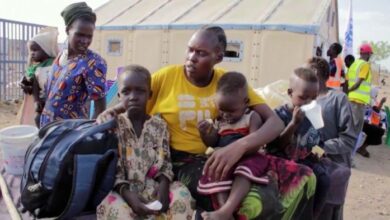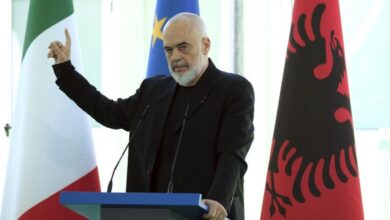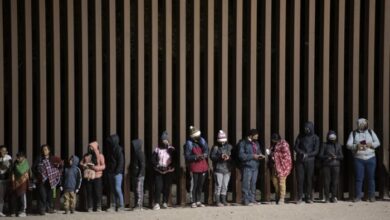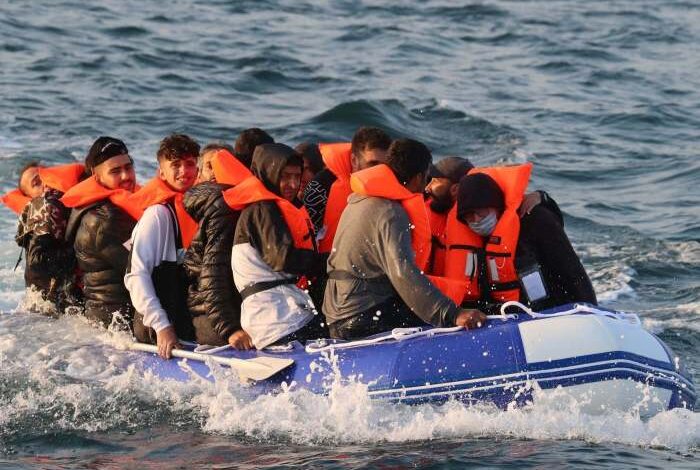
700+ Migrants Cross English Channel in Boats on Saturday
More than 700 migrants crossed the channel in small boats on saturday – 700+ Migrants Cross English Channel in Boats on Saturday, a stark reminder of the ongoing humanitarian crisis unfolding in the waters separating the UK and France. This recent incident, one of many, highlights the desperate measures individuals are taking to seek a better life, often risking their lives in the process.
The perilous journey across the English Channel underscores the complex geopolitical and humanitarian issues at play, forcing us to confront the realities of global migration and the need for a more humane and effective response.
The English Channel has become a tragic symbol of the challenges faced by refugees and asylum seekers attempting to reach the UK. This recent incident, while significant in its scale, is sadly not an isolated event. The increasing number of crossings reflects the complex factors driving migration, including conflict, persecution, and economic hardship.
While the UK and French governments grapple with managing these crossings, the focus must remain on ensuring the safety and dignity of those seeking a better life.
The Migrant Crisis in the English Channel
The English Channel has become a perilous crossing point for migrants seeking a better life in the United Kingdom. The number of individuals attempting this dangerous journey has surged in recent years, leading to a humanitarian crisis and raising concerns about the effectiveness of border control measures.
Historical Context of Migration Across the English Channel
The English Channel has historically served as a gateway for migration, with people crossing for various reasons, including economic opportunities, political asylum, and family reunification. The flow of migration has fluctuated over time, influenced by factors such as economic conditions, political events, and government policies.
Timeline of Significant Events Related to Migrant Crossings
The recent surge in migrant crossings began in the early 2000s, with the number of individuals attempting the journey increasing significantly in recent years. This trend has been driven by a complex interplay of factors, including:
- The 2011 Arab Spring:The uprisings in North Africa and the Middle East led to political instability and widespread displacement, prompting many to seek refuge in Europe.
- The Syrian Civil War:The ongoing conflict in Syria has resulted in a massive refugee crisis, with millions fleeing the country. Many Syrians have attempted to reach the UK via the English Channel.
- The European Migrant Crisis:The influx of migrants into Europe in 2015 and 2016, primarily from Syria, Afghanistan, and Iraq, further increased pressure on the UK’s border control measures.
Factors Driving Individuals to Attempt the Crossing
Individuals are driven to attempt the dangerous crossing for a multitude of reasons, including:
- Economic Hardship:Many migrants come from countries with high levels of poverty and unemployment, seeking better economic opportunities in the UK.
- Political Instability:Conflict, persecution, and human rights violations in their home countries force many to flee in search of safety and stability.
- Persecution:Individuals facing persecution due to their religion, ethnicity, or political beliefs may seek asylum in the UK to escape danger.
- Family Reunification:Some migrants are motivated by the desire to reunite with family members already living in the UK.
The Risks and Challenges of Channel Crossings: More Than 700 Migrants Crossed The Channel In Small Boats On Saturday
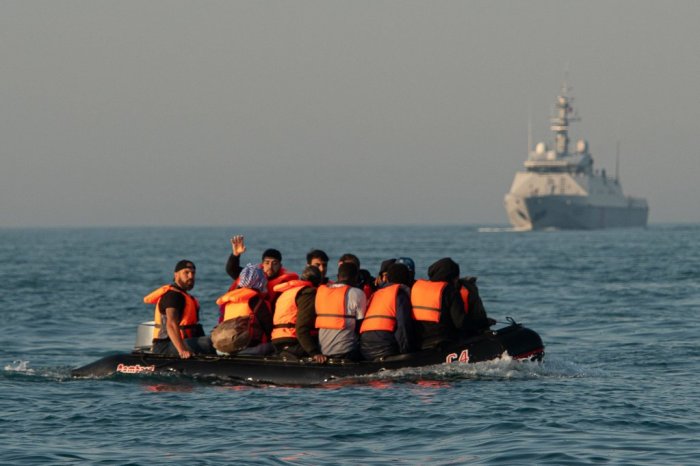
The English Channel, a narrow stretch of water separating the UK and France, has become a perilous route for migrants seeking a better life in the UK. The journey across the channel is fraught with danger, posing significant risks to the lives of those attempting it.
Dangers of Channel Crossings
The treacherous nature of the channel presents numerous dangers to those attempting the crossing. Small boats, often overcrowded and lacking proper safety equipment, are susceptible to rough seas and unpredictable weather conditions.
- Weather Conditions:The channel is notorious for its unpredictable weather, with strong currents, high waves, and sudden storms. These conditions can easily capsize small boats, leaving passengers vulnerable to drowning.
- Seaworthiness of Vessels:The boats used for crossings are often unsuitable for the journey, lacking the necessary safety features and stability. Overcrowding further exacerbates the risk of capsizing and accidents.
- Risk of Drowning:The most significant danger associated with channel crossings is the risk of drowning. The cold water temperatures, strong currents, and lack of safety equipment make survival difficult for those who fall overboard.
Fatalities and Rescues, More than 700 migrants crossed the channel in small boats on saturday
The number of fatalities and rescues related to channel crossings has been steadily increasing in recent years. The International Organization for Migration (IOM) estimates that over 400 people have died attempting to cross the English Channel since 2014.
- Fatality Statistics:The exact number of fatalities is difficult to determine due to the clandestine nature of the crossings. However, reports indicate that the number of deaths has been increasing, highlighting the growing danger of this route.
- Rescue Efforts:The UK’s Coastguard and other maritime rescue organizations are actively involved in rescuing migrants attempting to cross the channel. However, the vastness of the channel and the unpredictable weather conditions make rescue efforts challenging and sometimes unsuccessful.
Legal and Ethical Challenges
The issue of migrant rescue operations and border control measures in the English Channel presents complex legal and ethical challenges.
- International Law:The principle of “non-refoulement” in international law prohibits countries from returning asylum seekers to a place where they face persecution. This principle is at the heart of the debate surrounding migrant rescue operations in the channel.
- Border Control Measures:The UK government has implemented various measures to deter illegal crossings, including increased patrols and the use of drones. However, critics argue that these measures are ineffective and potentially harmful to migrants.
- Ethical Considerations:The ethical implications of border control measures and rescue operations are complex. While countries have a responsibility to protect their borders, they also have a moral obligation to ensure the safety of migrants and asylum seekers.
The Response of Governments and Organizations
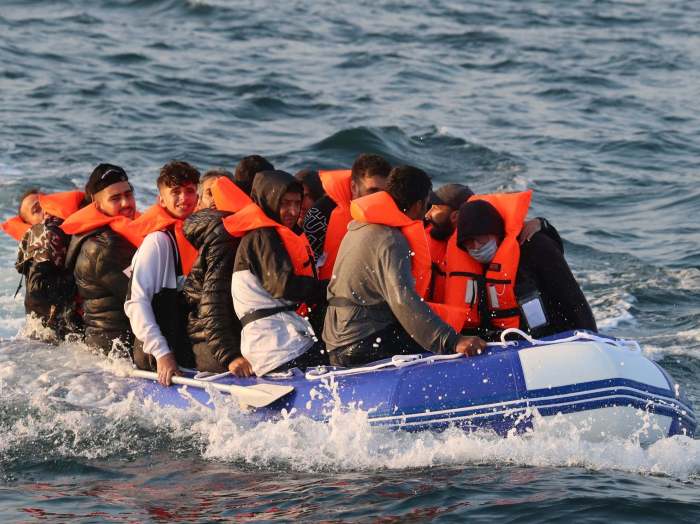
The migrant crisis in the English Channel has prompted a range of responses from governments and international organizations, each with their own approaches and priorities. While the UK and French governments have implemented different policies, their efforts are intertwined, and the complexities of managing migrant flows require collaboration with international organizations like the UN Refugee Agency.
Policies and Actions of the UK and French Governments
The UK and French governments have adopted distinct policies regarding migrant crossings. The UK government has focused on deterring crossings, emphasizing the dangers involved and pursuing agreements with France to increase patrols and crack down on smuggling networks. This approach has been criticized by some for failing to address the root causes of migration and for prioritizing border security over the welfare of migrants.The French government, on the other hand, has taken a more humanitarian approach, providing support and assistance to migrants in France and working to address the underlying factors that drive migration.
However, France has also faced criticism for not doing enough to prevent crossings, with accusations that its efforts are insufficient.
- UK Policies:The UK government has implemented a number of policies aimed at deterring migrant crossings, including increased patrols in the English Channel, tougher penalties for people smugglers, and agreements with France to increase cooperation on border security. The government has also proposed a controversial plan to send asylum seekers to Rwanda for processing, which has been met with legal challenges and criticism from human rights groups.
- French Policies:The French government has focused on providing support and assistance to migrants in France, including access to shelter, food, and medical care. France has also worked to address the root causes of migration, such as poverty and conflict, through development aid and diplomatic efforts.
The news of over 700 migrants crossing the Channel in small boats on Saturday was unsettling, but honestly, it’s not the most bizarre thing I’ve read this week. That honor goes to the question, “Why does John Malkovich want to kill me?” why does john malkovich want to kill me I mean, seriously, what kind of existential crisis leads to that thought?
Maybe I should start worrying about John Malkovich, but honestly, the migrant situation feels far more pressing right now.
However, France has faced criticism for not doing enough to prevent crossings, with some arguing that its efforts are insufficient.
Role of International Organizations
International organizations, such as the UN Refugee Agency (UNHCR), play a crucial role in assisting migrants and advocating for their rights. The UNHCR provides protection and assistance to refugees and asylum seekers, including legal advice, access to healthcare, and resettlement opportunities.
It’s heartbreaking to see so many people risking their lives to cross the Channel in small boats, seeking a better life. It’s a reminder of the desperate situations that drive people to such lengths, often fueled by conflict and instability in their home countries.
For more information on the complex issues facing the Middle East, a region often at the heart of these migration journeys, you can find resources here. Understanding the root causes of these migrations is crucial to finding long-term solutions and offering real hope to those seeking refuge.
It also works to address the root causes of displacement and to promote solutions that respect the rights of refugees.The UNHCR has been critical of the UK government’s approach to migrant crossings, arguing that it prioritizes deterrence over protection and that the proposed Rwanda plan is a violation of international law.
The news of over 700 migrants crossing the English Channel in small boats on Saturday is certainly a stark reminder of the ongoing migration crisis. Meanwhile, across the continent, the SPD narrowly leads the Brandenburg state election , a development that could have significant implications for German politics.
It’s fascinating to see how these two seemingly disparate events reflect the complexities of our globalized world.
The UNHCR has also called for greater international cooperation to address the root causes of migration and to provide safe and legal pathways for people seeking asylum.
Challenges and Complexities of Managing Migrant Flows
Managing migrant flows in the English Channel presents significant challenges. One key challenge is ensuring the safety of those attempting crossings, as small boats are often overcrowded and lack safety equipment. Another challenge is preventing people smugglers from exploiting vulnerable individuals, who may be forced into dangerous situations.
- Safety Concerns:The use of small boats in the English Channel poses significant safety risks to migrants. The boats are often overcrowded, lack safety equipment, and are exposed to harsh weather conditions. This has resulted in a number of deaths and near-misses, highlighting the need for effective rescue and prevention measures.
- Combating People Smuggling:People smugglers exploit vulnerable individuals and profit from their desperation. Combating people smuggling requires coordinated efforts between countries to disrupt smuggling networks and prosecute those involved. This includes sharing intelligence, strengthening border security, and addressing the underlying factors that drive people smuggling.
- Addressing Root Causes:Managing migrant flows requires addressing the root causes of migration, such as poverty, conflict, and persecution. This involves promoting sustainable development, resolving conflicts peacefully, and upholding human rights. International cooperation is essential to address these complex challenges.
Public Opinion and Media Coverage
Public opinion in the UK and France regarding migrant crossings in the English Channel is complex and often polarized, with a range of concerns and attitudes influencing the debate. Media coverage plays a significant role in shaping public discourse and influencing policy decisions, but it is also subject to potential bias and misinformation.
Public Opinion in the UK and France
Public opinion in the UK and France regarding migrant crossings in the English Channel is a multifaceted issue, influenced by a variety of factors including economic concerns, security anxieties, and humanitarian considerations.
- Concerns about Immigration:A significant portion of the public in both countries expresses concern about the potential impact of increased immigration on social services, housing, and employment opportunities.
- Security Concerns:The crossings are often perceived as a security risk, with concerns about potential terrorist threats or organized crime activities.
- Humanitarian Concerns:A substantial segment of the population expresses sympathy for the plight of migrants and refugees seeking a better life, emphasizing the importance of providing humanitarian assistance.
Media Coverage and Public Discourse
Media coverage plays a crucial role in shaping public discourse and influencing public opinion on the issue of migrant crossings.
- Framing the Narrative:Media outlets often frame the issue in ways that emphasize certain aspects and downplay others, influencing how the public perceives the situation.
- Emotional Appeals:Media coverage often utilizes emotional appeals, such as images of distressed migrants or sensationalized accounts of dangerous crossings, to evoke strong reactions from viewers.
- Policy Influence:Media coverage can influence policy decisions by highlighting specific concerns and generating public pressure on governments to take action.
Potential for Bias and Misinformation
Media reporting on migrant crossings can be subject to bias and misinformation, potentially distorting public understanding of the issue.
- Selective Reporting:Media outlets may selectively report on certain aspects of the issue, omitting or downplaying information that contradicts their narrative.
- Sensationalism:Some media outlets may sensationalize the issue, exaggerating the dangers of crossings or portraying migrants in a negative light to attract viewers.
- Misleading Statistics:The use of misleading statistics or anecdotal evidence can contribute to misinformation and distort public perceptions.
Potential Solutions and Future Directions
Finding lasting solutions to the complex issue of migrant crossings across the English Channel requires a multifaceted approach that addresses both the push and pull factors driving migration, as well as the humanitarian and security concerns involved.
Enhanced Cooperation Between Countries
Effective collaboration between the UK, France, and other European countries is crucial for addressing the root causes of migration and preventing dangerous crossings. This includes sharing intelligence, coordinating border security efforts, and implementing joint initiatives to tackle criminal networks facilitating illegal migration.
- Joint patrols:Increased cooperation between UK and French authorities in joint patrols along the French coastline could deter crossings and apprehend smugglers.
- Information sharing:Sharing intelligence on smuggling networks and migrant routes can help both countries better target their efforts and disrupt criminal activity.
- Development assistance:Providing development assistance to countries of origin can help address poverty, conflict, and persecution, reducing the push factors driving migration.
Improved Border Security
Strengthening border security measures in France and along the English Channel is essential to deterring crossings and preventing the loss of life. This can involve:
- Increased surveillance:Utilizing advanced surveillance technologies, such as drones and thermal imaging cameras, can improve detection and interception of migrant boats.
- Enhanced border patrols:Increasing the number of border patrol officers and deploying them strategically along the coastline can deter crossings and apprehend smugglers.
- Physical barriers:While controversial, some argue that physical barriers, such as fences or floating booms, could deter crossings and make it more difficult for smugglers to operate.
Legal Pathways for Migration
Providing safe and legal pathways for migration is essential to address the demand for migration and reduce the reliance on dangerous and illegal routes. This can involve:
- Refugee resettlement programs:Expanding resettlement programs for refugees from conflict zones can provide a safe and legal alternative to dangerous crossings.
- Family reunification schemes:Streamlining family reunification processes can allow individuals to join their families in the UK and France legally.
- Work visas:Expanding work visa programs for skilled workers from countries of origin can provide a legal route for migration based on economic needs.
Comparison of Proposed Solutions
| Solution | Advantages | Disadvantages |
|---|---|---|
| Enhanced Cooperation Between Countries | – Shared intelligence and resources
|
– Requires strong political will and trust
|
| Improved Border Security | – Deters crossings and prevents loss of life
|
– Can be expensive and resource-intensive
|
| Legal Pathways for Migration | – Reduces reliance on dangerous and illegal routes
|
– May increase demand for migration
|

